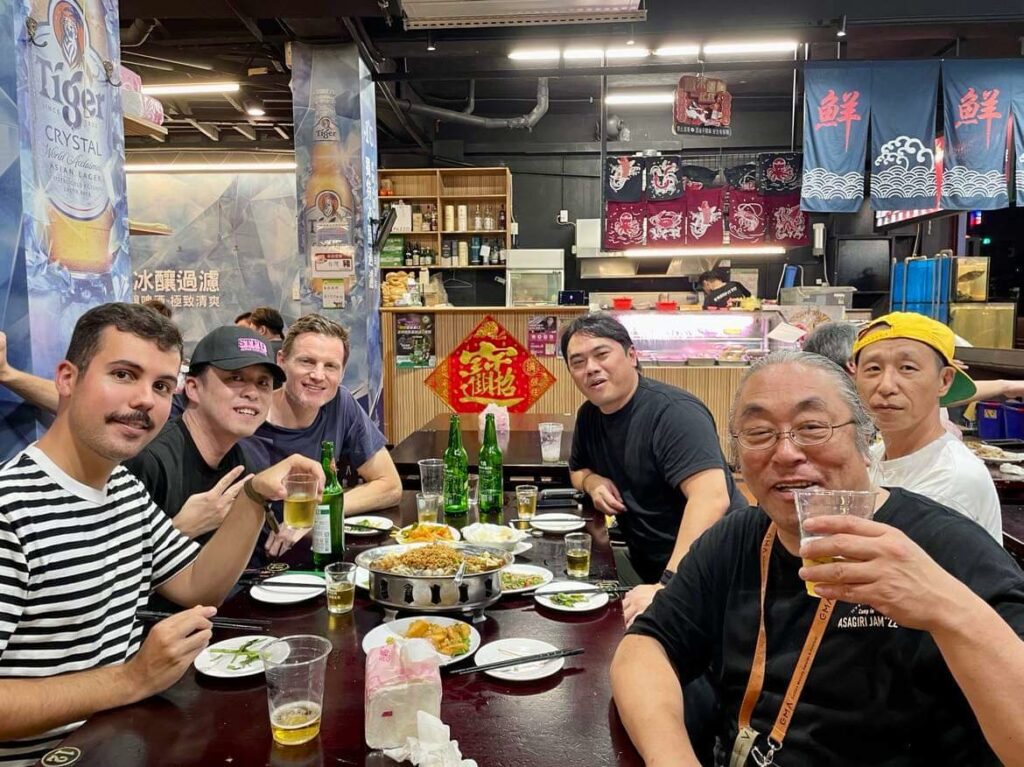Shogo Komiyama, a Japanese-Argentinian, spent his teenage years in South America before choosing to return to Japan with his unique cross-cultural background. He brought the rhythms of Cumbia music from South America to Asia and later took various diverse ska and reggae bands from Asia to destinations around the world through his network, Japonicus.
We thank the 34th Golden Melody Awards for facilitating this interview.

Shogo Komiyama at Taiwan style beer house
—Your name occurred at Urban Nomad a few years ago before the pandemic, is this your first connection with Taiwan? On what occasion did you start building the connection?
I grew up in Argentina, and there’s a province in Northern Argentina called “Formosa Province”, it is a part of Gran Chaco- an alluvial plain between Argentina, Paraguay, and Bolivia with abundant natural resources, it is a beautiful place. So upon hearing Taiwan was also called “Formosa”, I started wondering what common ground Taiwan shares with the province.
Dave and I have been long-term friends, and I started developing Japonicus’ network in Asia around 15 years ago, at that time, the Japanese government was unwilling to support the cultural industry, and I’m a proactive person so I decided to build the connection you see today.
Much of the propaganda you can see in Japan is making our people hold hostile attitudes towards our neighborhood, it causes conflicts between us and Chinese people or Korean people. But I believe one should separate the government from the people.
—How did you promote Cumbia in a developed market like Japan? And you eventually, could you share the experience working with major music events such as Fuji Rock?
Japan has a lot of music freaks, we’re known for the record store culture, but back in the 90s, nobody knew about Cumbia because there were no records distributed in Japan.
I’m the person to bring Cumbia into Japan, and what I did was bring records to the DJs of Ska scene and Reggae scene, specifically to the DJ collective Caribbean Dandy, I’m currently working as their manager, and my wife, DJ Txako, is the only female member of Caribbean Dandy, she still DJs with a booklet of thousands of CDs in her set, and she never prepared the playlist beforehand.
When they played the record in Japanese festivals and club music parties, everyone was asking “What is it?” in the beginning, because it sounds a bit like reggae and a bit like ska, then I introduced “This is Cumbia from the Caribbean and the Colombian coast.” This music shares many similarities in rhythms and melodies because of the offbeats, that was how I introduced a new genre of music to the Japanese market.
About working with Fuji Rock, I am a personal friend of one of the organizers Jason Mayall, I knew him through his brother Gaz Mayall - the leader of the legendary ska band The Trojans. Jason used to travel to Colombia in the 80s, and he would do mixtapes from the cumbia vinyl records he bought and give them to Joe Strummer (vocalist of The Clash), Jason appeared in Joe’s documentary movie “The Future is Unwritten” where you can see Joe Strummer talking about the mixtapes.
—Does the name "Radical Music Network" have a political meaning? What is the significance of the term "radical" concerning the event?
The name Radical Music Network came from an interview I did with a Japanese magazine, and while I was thinking about the title of the festival, a friend of mine suggested using the article title as the name, so I asked the journalist if I can use the name, and he gladly agreed.
But instead of “radical music”, I would say what I do is about “rebel music”, which means protest music. Probably because I am from the punk generation. So I think it is natural that if an artist has the chance to talk and say something to a big audience, you better say something with meaningful things, you know?
Like reggaeton has become full of discrimination these days or trap music nowadays, it has lost its original meaning, and for that, I am more dedicated to rebel music than ever. When I started to work with all these bands in the 90s, they all had meaningful lyrics. And that's why everyone got connected in those days, even without any internet.
But all the bands from my generation that I’ve worked with, whether they’re from Europe, America, or South America, like Fishbone, Fermin Muguruza (Basque Country), Manu Chao, Asian Dub Foundation, Todos Tus Muertos and Los Fabulosos Cadillacs (Argentina) that I am involved in are all considered “rebel music”.
Don’t get me wrong, being a rebel is not like a terrorist, but I would imagine a guerilla - usually are small groups of weak people that are protecting the country or their families, they have no power so they have to fight against the big enemy through this way.
—Japan and Taiwan are both island countries, as an “islander” that is not from an island, what is your perspective on the “islander’s common ground” - the culture shared between the two countries?
Islands have natural borders, so it's easier to keep your culture and your traditions because you have not been influenced by things from outside, unlike in the continent, which many people can have access to. Take the U.S. as an example, they are the “strongest” country in the world yet they don’t have their own culinary culture.
I don’t know much about Taiwan to be honest, but Japan has been keeping the ethnicity quite pure without much mix until recently.
But now, we’ve already lost a lot, especially the dialects, and all things connected to the language. Lots of Taiwanese people love Japan. It is good but doesn't copy us. But instead, learn from our failure. I think Taiwan is still in time to keep its tradition, the cultural heritage.
In this case, education is very important. It is important that people still speak their language, and it doesn’t matter if they are small communities, but you still have people who keep their old traditions, and this is priceless.
—What is Japonicus focusing on? How do you help your artists?
I'm born in Argentina, and I’m very proud of my Asian roots as well as my Latino roots. And I think it is my mission to help non-English singing bands tour Asia and the rest of the globe. I help my friends to make communication with the world because there are already tons of agencies focusing on English singing artists. (laughs) I made loads of musician friends because I am constantly traveling around the world, my multicultural background is the reason why I'm doing this, because if I don't do it, probably no one else would.
Japonicus has been doing this for more than 30 years. Now things are getting much easier, many bands can go touring. But for me, the most important thing is to get the respect. Sometimes, when I hear “Yeah, we toured America, we toured Europe…” Congratulations. But for me, it's not only to make money, it's a matter of respect. I want the West to think “Wow! Asians are good! I want to be like them. I want to be their friend.” I think as patience we have something to transmit to the rest of the agency in general, we have this kind of complex against the rest of the world.

























